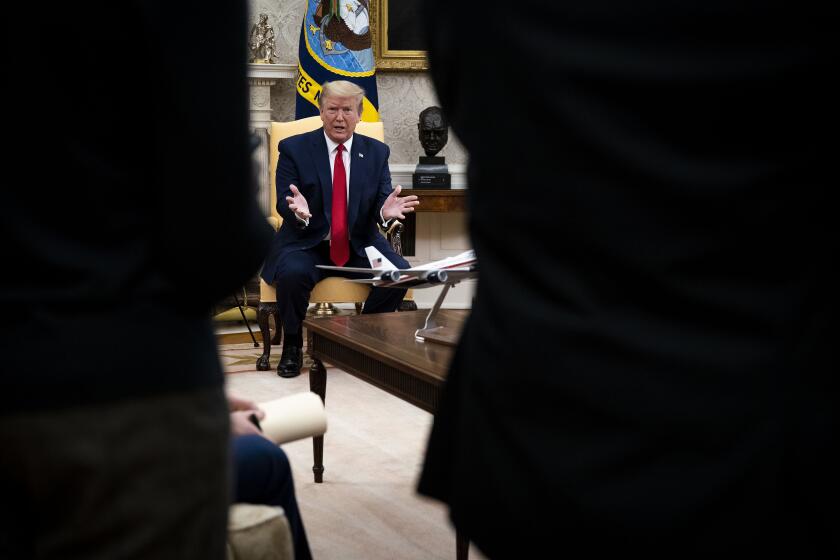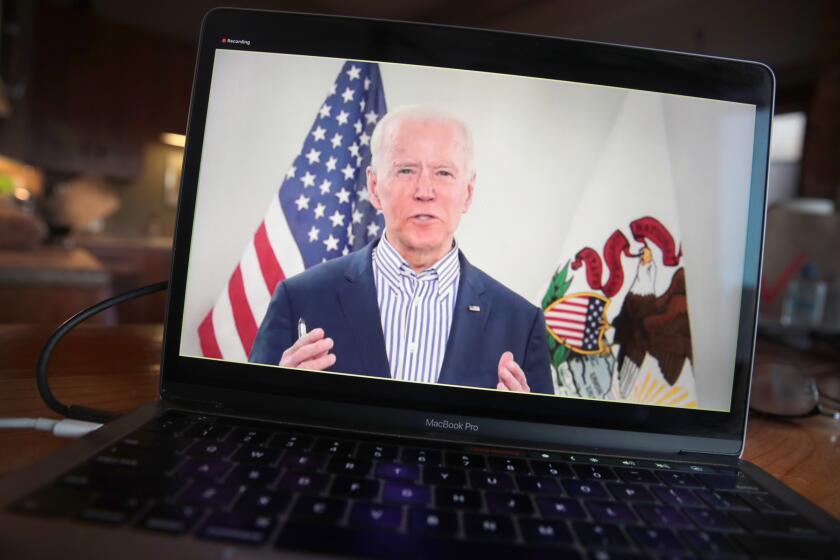Trump lashes out with distractions and disinformation
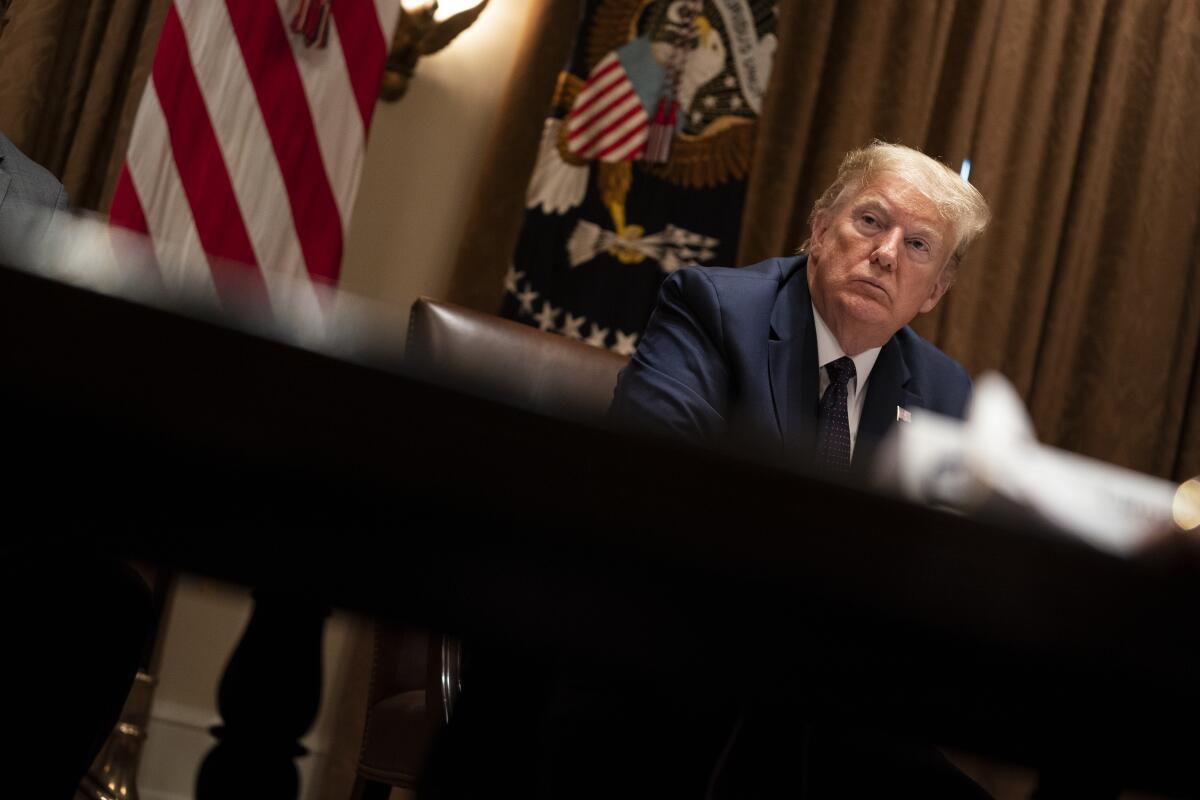
- Share via
WASHINGTON — President Trump has accelerated his attacks on government watchdogs, judges, reporters and other independent voices as he runs for reelection, escalating his spread of disinformation about perceived enemies and his administration’s record during the COVID-19 crisis.
Trump fired yet another inspector general, raged against a government whistleblower and repeatedly retweeted video of a local TV reporter being harassed in New York — all since Friday. He also amplified a sinister conspiracy theory he dubbed “Obamagate” in which he alleges, but never specifies, crimes by his predecessor.
On Monday, Trump abruptly said he has been taking hydroxychloroquine pills daily for “about a week and a half” as a preventative against the novel coronavirus, dramatically intensifying his efforts to promote an unproved anti-malaria drug that he has touted as a potential “game changer” for dealing with the pandemic.
His comments caused alarm because the Food and Drug Administration warned last month that the prescription drug has “not been shown to be safe and effective” at treating or preventing COVID-19, saying it could cause “serious heart rhythm problems.”
Experts struggled to think of a historical parallel where the president has turned the world’s most powerful and influential office into a megaphone for wholesale fabrications and bizarre claims in an effort to confuse voters and salvage his own political future.
With the economy in free fall and deaths still rising from the coronavirus crisis, President Trump argued Friday that voters shouldn’t hold him responsible.
“Trump is certainly not the first politician to lie or invent stories,” said Eileen Culloty, who researches disinformation at Dublin City University in Ireland. “But his history of making baseless, conspiratorial claims — whether it’s Obama’s birth certificate, linking Ted Cruz’s family to the Kennedy assassination or now Obamagate — is striking for its scale and frequency.”
Critics said Trump’s messaging was particularly destructive as Americans struggle with the pandemic, which has crippled the economy and killed more than 90,000 in the U.S. as of Monday.
“A pandemic is the perfect laboratory for disinformation because people are scared, they’re anxious — and all of the social science around conspiracy theories shows when people feel anxious and scared, they’re more likely to believe conspiracy theories,” said Richard Stengel, a former editor of Time magazine and former senior State Department official.
“Trump has figured that out. This campaign is headed to a low point that we’ve never experienced before in American history, because he is not at all compelled to align his message with reality,” he added.
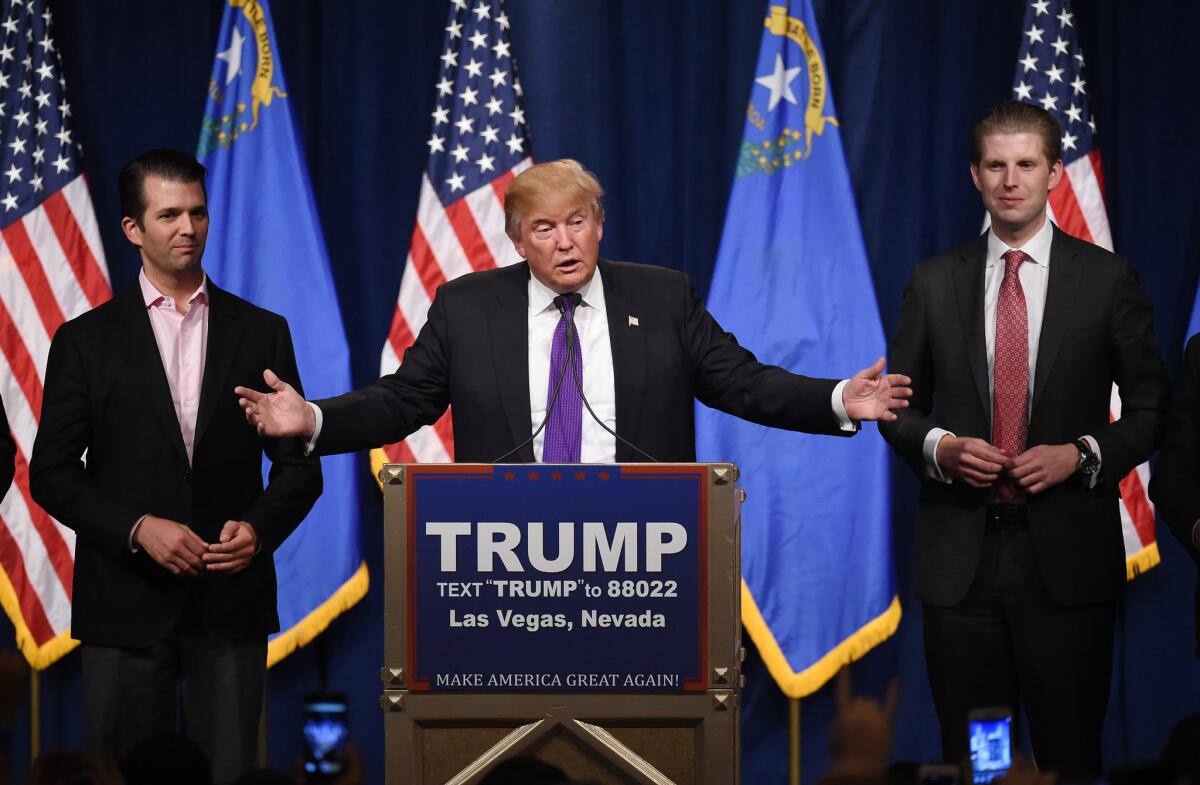
Trump’s adult children have gone even further in attempts to smear his opponents and raise doubts among voters.
Trump’s eldest son, who serves as a campaign surrogate, posted an Instagram meme outlandishly describing Joe Biden, the presumptive Democratic nominee, as a pedophile. Donald Trump Jr. later claimed he was joking but continued to share videos of the former vice president touching women in what he described as an inappropriate way.
The president’s other son and campaign surrogate, Eric Trump, claimed in a weekend Fox News interview that Democrats were somehow manipulating the coronavirus to prevent his father from holding large campaign rallies.
“They’ll milk it every single day between now and Nov. 3, and guess what? After Nov. 3, coronavirus will magically all of a sudden go away and disappear, and everybody will be able to reopen,” he said.
Trump’s allies have routinely excused his outlandish attacks by describing him as a victim of partisan attacks who is fighting dirty by necessity. Still, Trump learned early on that the most incendiary attacks earned him the most attention. Since taking office, his torrent of falsehoods has set records.
The strategy was outlined two years ago by the president’s former political advisor Steve Bannon.
“The Democrats don’t matter,” Bannon told an interviewer. “The real opposition is the media. And the way to deal with them is to flood the zone with [excrement].”
As Trump hijacks online innovations that progressives pioneered, Biden keeps stumbling online. The left’s digital experts warn he is losing time to close the gap.
Trump is the first president to rely so extensively on social media to bypass the news organizations that traditionally served as a check on the White House. He has nearly 80 million Twitter followers, and his campaign routinely posts tailored ads on Facebook and other digital platforms.
Trump has long demonized major media organizations as unpatriotic and unfair. But he has expanded his attacks beyond the White House press corps as polls show broad public disapproval of his response to the coronavirus crisis.
On Monday, he again retweeted a video of a local television reporter getting heckled with profane gestures and shouts during an anti-shutdown protest in Long Island, N.Y.
“They hate Fake News, and so do I!” Trump wrote atop the video.
Trump’s barrage of accusations and counterattacks helps muddy the truth about his administration’s performance. Trump puts all criticism into a jumble of partisan bickering, too messy for many voters to unravel.
Experts in disinformation say Trump’s attacks on fact-checkers as well as internal government watchdogs serve a common purpose: working the refs.
“One of the strategies that Donald Trump uses is to flood all of those spaces,” said Graham Brookie, director of the Digital Forensic Research Lab at the nonpartisan think tank Atlantic Council, which researches the intersection of governance, technology, security and social media.
“If you can’t tell what is true, then we’ve basically lost the shared sets of facts that democracy is based on,” he said.
Lisa-Maria Neudert, a researcher at the Oxford Internet Institute at the University of Oxford in England, said modern right-wing politicians in Europe have tried similar tactics but with fewer resources and less success.
“In most democratic countries, what we see is a public outcry,” she said. “But Trump not only gets away with it, he’s celebrated for it.”
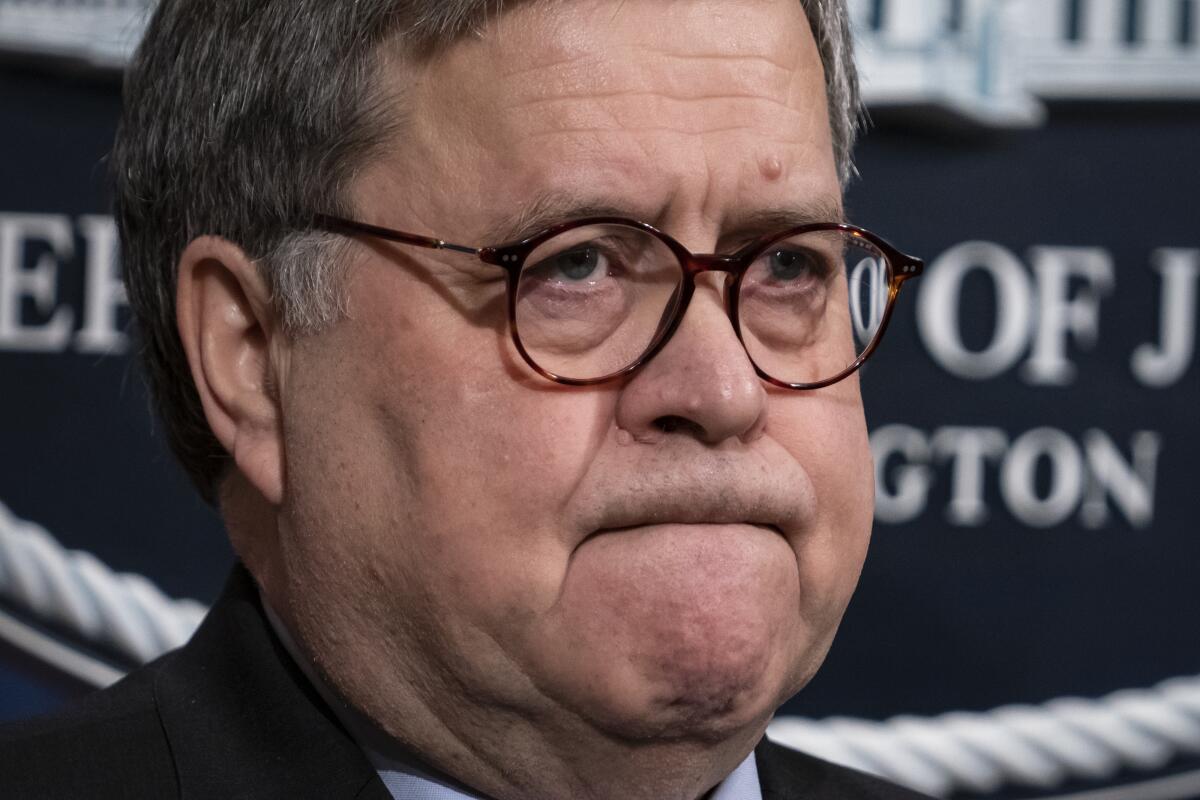
Trump has increasingly alleged that former President Obama, Biden and members of their administration committed unspecified crimes during the Russia investigation, which Trump now calls “Obamagate,” and urged that they be hauled before Congress or prosecuted.
Two of Trump’s most public defenders have declined both suggestions.
Sen. Lindsey Graham (R-S.C.), who heads the Senate Judiciary Committee, said he has no plans to invite either Obama or Biden to testify. And Atty. Gen. William Barr told reporters Monday that he doesn’t expect a “criminal investigation of either man” based on “the information I have today.”
Speaking later at the White House, Trump professed surprise at Barr’s comment, saying he has “no doubt that they were involved in it.”
Barr recently asked a federal judge to drop the case against Michael Flynn, the president’s first national security advisor. Flynn pleaded guilty more than two years ago to lying to federal agents about his conversations with the Russian ambassador but later claimed he was the victim of prosecutorial misconduct.
U.S. District Judge Emmet Sullivan has appointed a retired judge to argue against Barr’s motion and to recommend whether Flynn should be charged with contempt for perjury.
Flynn has “a judge that I guess doesn’t like him very much,” Trump told Fox Business last week. “Maybe the judge doesn’t like me very much.”
Trump has chipped away at independent oversight by firing federal officials empowered to find waste, fraud and abuse.
On May 1, he ousted Christi A. Grimm, the principal deputy inspector general for the Department of Health and Human Services, whose office had issued a report critical of the nation’s response to the coronavirus.
A month earlier, he removed Michael Atkinson, the intelligence community watchdog, as revenge for his role in providing Congress a whistleblower complaint that ultimately led to Trump’s impeachment by the House.
On Friday night, Trump sacked the State Department’s inspector general, Steve Linick. He was reportedly investigating Secretary of State Mike Pompeo for improperly using a political appointee to perform personal tasks for him and his wife.
On Monday, the president said he was removing inspectors general because they were appointed by Obama and were unfair to his administration.
“If they were put in by me, and it was somebody else’s administration, especially the other party, it could very well be that you’d be treated unfairly,” he said.
The role of inspectors general was strengthened after the Watergate scandal in the 1970s as Congress assumed a more investigative and adversarial role in countering the executive branch.
But those checks and balances have eroded in recent years, and Trump is hastening their demise.
“He is in a class by himself,” said Kathryn Olmsted, a UC Davis history professor who has studied post-Watergate political reforms. “He doesn’t feel constrained by rules or optics or norms.”
More to Read
Get the L.A. Times Politics newsletter
Deeply reported insights into legislation, politics and policy from Sacramento, Washington and beyond. In your inbox twice per week.
You may occasionally receive promotional content from the Los Angeles Times.
